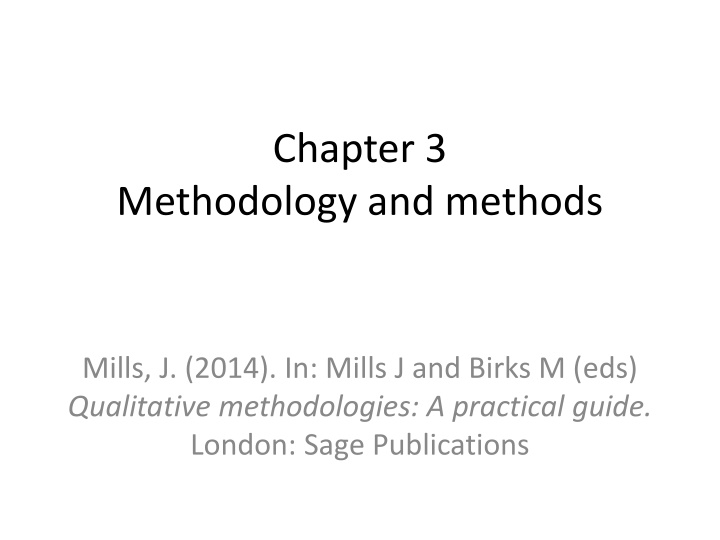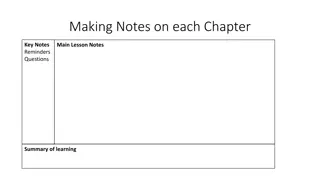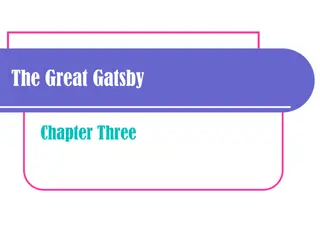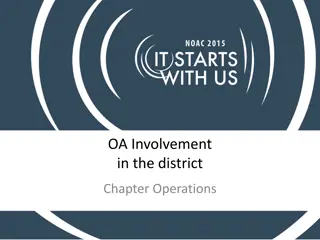Chapter 3
This content explores the differentiation between research methodology and methods in qualitative research, highlighting the importance of methodology in shaping research design and outcomes. It delves into the philosophical and methodological aspects that guide researchers in their approach to studies.
Download Presentation

Please find below an Image/Link to download the presentation.
The content on the website is provided AS IS for your information and personal use only. It may not be sold, licensed, or shared on other websites without obtaining consent from the author.If you encounter any issues during the download, it is possible that the publisher has removed the file from their server.
You are allowed to download the files provided on this website for personal or commercial use, subject to the condition that they are used lawfully. All files are the property of their respective owners.
The content on the website is provided AS IS for your information and personal use only. It may not be sold, licensed, or shared on other websites without obtaining consent from the author.
E N D
Presentation Transcript
Chapter 3 Methodology and methods Mills, J. (2014). In: Mills J and Birks M (eds) Qualitative methodologies: A practical guide. London: Sage Publications
Learning objectives Differentiate between research methodology and methods Identify the links between philosophy, methodology and methods that result in a research design Discuss common critiques of the use of qualitative methodologies Describe methods commonly used in qualitative research designs
Differentiating methodology from methods Methodology: Occupies a middle ground between discussions of issues in the philosophy of social science and methods Determines how the researcher thinks about a study, how they make decisions about a study and how they position themselves in relation to participants and the data
Differentiating methodology from methods Methodology: The lens through which the researcher looks when deciding on the methods they will use to answer their research question
Differentiating methodology from methods Methods are techniques and procedures that are used to: choose and recruit participants (sampling) generate and collect data conduct fieldwork
Differentiating methodology from methods record data analyze data report findings
Differentiating methodology from methods Drives researcher s desires Inspires researcher to ask questions they are interested in Philosophical position Directs the development of the research question Directs the selection of methodology Desired research outcomes Directs the selection of methods to recruit participants, generate and collect data, analyze data and report findings Methodology
Differentiating methodology from methods Philosophically and methodologically things are never particularly straightforward Qualitative methodologies may be aligned with a number of different themes of knowledge as highlighted in the following slides, which map methodologies
Differentiating methodology from methods Map of methodologies Theme of knowledge Positivism Qualitative methodology X Outcome X Post-positivism Grounded theory Knowledge of process & outcome Discourse analysis Knowledge of discourse, illumination & change Critical + Feminism + Race Ethnography Knowledge, illumination & change Narrative inquiry Knowledge, illumination & change
Differentiating methodology from methods Map of methodologies Theme of knowledge Constructivism of Interpretivism Qualitative methodology Ethnography Outcome Knowledge of culture Grounded theory Knowledge of process & outcome Historical research Knowledge of history Case study Situated knowledge Phenomenology Knowledge of lived Experience Action research Knowledge of process, outcome & change
Differentiating methodology from methods Map of methodologies Theme of knowledge Qualitative methodology Outcome Participatory + postmodern Action research Knowledge, participatory process, outcome & change Discourse analysis Knowledge of Discourse Case study Situated Knowledge & Change Grounded theory Knowledge about Process, Outcome & Change
Differentiating methodology from methods Qualitative research: is a creative enterprise aims to answer research questions using rigorous, flexible, best-fit approaches is a best-fit approach that results in methodological linking to themes of knowledge
Common critiques of qualitative methodologies Failure to rigorously operationalize concepts and therefore to document measurable differences Does not rule out rival explanations through physical or statistical control Failure to produce generalizable findings (Hammersley, 2008)
Common critiques of qualitative methodologies Take home lesson: Invest time in thinking through decisions around the design of your qualitative research study Reading and discussing methodological ideas is a sort of intellectual muscle-building exercise, time out in the brain gymnasium, before returning to the task at hand, hopefully a little stronger and more alert (Searle, 2003: 181)
Research methods The researcher is an instrument who can both collect and generate data (Creswell, 2013; Janesick, 2004; Merriam, 2009; Stake, 2010) Data collection occurs when data is extracted from static materials such as documents and the literature (Birks and Mills, 2011: 174) Data generation occurs when the researcher engages directly with a data source to produce material for analysis, such as occurs during in- depth interviewing (Birks and Mills, 2011: 174)
Research methods: data generation and collection Methods of data generation and collection may include capturing: records of interviews audio-visual materials physical objects observation documents including surveys, peer-reviewed literature, grey literature, memos and fieldnotes
Research methods: data analysis Qualitative research designs include three interlinked data analysis strategies: preparing and organizing the data coding representing the data in text, tables or figures (Creswell, 2013)
Summary Difference between methodology and methods Links between themes of knowledge, qualitative methodology and research outcomes Critiques of qualitative methodologies Methods used to collect, generate and analyze data
References Birks M and Mills J. (2011) Grounded Theory: A practical guide, London: Sage Publications. Creswell J. (2013) Qualitative inquiry and research design: choosing among five approaches, Thousand Oaks: Sage Publications Inc. Hammersley M. (2008) Questioning qualitative inquiry : critical essays, Los Angeles ; London: Sage. Janesick V. (2004) "Stretching" exercises for qualitative researchers, Thousand Oaks, California: Sage Publications, Inc. Merriam S. (2009) Qualitative research: A guide to design and implementation, San Francisco: Jossey-Bass. Seale C. (2003) Quality in Qualitative Research. In: Lincoln Y and Denzin N (eds) Turning points in qualitative research: Tying knots in a handkerchief. Thousand Oaks, California: Sage, 169-184. Stake R. (2010) Qualitative Research: Studying how things work, New York: The Guilford Press.














